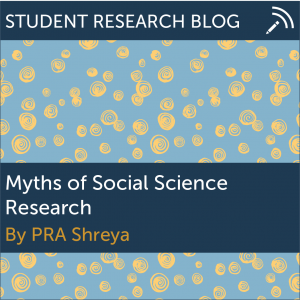By Shreya Murthy, OUR Peer Research Ambassador
 Getting into research is hard enough but for social science students there is an added level of effort: combating the myths and misconceptions of doing social science research. Here are some common myths and the real truth behind them:
Getting into research is hard enough but for social science students there is an added level of effort: combating the myths and misconceptions of doing social science research. Here are some common myths and the real truth behind them:
Myth 1: Funding is only for the STEM Majors
Reality: Absolutely not!
During my freshman year, I still very much believed this. At the beginning of my second semester, I had a chance to meet with Dr. Caroline McGuire who showed me the potential grant programs I could apply for, but I was still very skeptical. After proposing an honors conversion with Dr. David Richards, I was encouraged to pursue a UConn IDEA Grant. Melissa Berkey, the program director, not only said that social science research projects were welcomed, they were encouraged and getting funded!
UConn IDEA Grants and SURF Awards are great ways to fund social science research. Furthermore, there is an entire funding program – the SHARE Award – centered around giving social science, humanities, and arts students the opportunity to be apprentices to faculty, assisting them with their research to learn how to conduct research in these areas.
Myth 2: You cannot change your topic
Reality: Yes, you can!
While I enjoyed the research I was doing with the IDEA Grant, I realized I was ready to move on to a new topic. However, I was worried that I would have to start from scratch with this new research and that I would not be able to because of my grant. However, this is not the case at all. Faculty and OUR understand that as college students we are finding our interests and working out what we want to do in our careers. I was able to turn my research focus in a completely new direction and to continue working under the mentorship of Dr. Richards while developing new professional connections with faculty that would be helpful to my research.
Research is a part of your college experience and you should use it to help you to develop your interests and find your true passion. OUR has plenty of resources to help you find and connect with faculty who can support your research interests. Furthermore, receiving a grant will not require you to focus on one topic for the rest of your undergraduate career. OUR and other funding programs want you to explore and to learn from this process.
Myth 3: Research cannot cross disciplines or be out of your major
Reality: Yes, it can!
My research spans political science, finance, business law, human rights, and criminology and that is perfectly okay. Working on a multidisciplinary topic is a really cool way to find new and innovative solutions to conventional problems. This type of research is supported and encouraged! Furthermore, many faculty members are also working on interdisciplinary projects and are great sources of information and advice for managing these types of projects. They also know faculty members across the university that would be helpful to your project and would be willing to advise you. I met many of my research advisors through recommendations from my mentor or class professors.
Myth 4: There are not a lot of people that are available to help me with this research
Reality: There are so many resources for you!
UConn is a Research 1 institution. This means that most faculty here are actively engaged in research that they could talk to you about. While this does not mean that they will definitely be able to help you with your research, it does mean that there is a pool of people who could be great resources for you! Professors are generally really excited to see undergraduates doing research and even if the project does not perfectly match their specialty or field of research, they do have the understanding of research methods and design to be able to support you in your research. The OUR also has a wide variety of resources, from the website to in-person advising. The website offers a lot of research advice from building relationships with faculty or to presenting your research. OUR also has professional advisors who can support you through the process or who can work through grant proposal with you. There are also Peer Research Ambassadors such as myself who are undergraduate researchers with experience working with OUR and research who can help you with general questions and give you another student perspective.
Research should not only be through of as something you do with test tubes in a lab. It can be investigating any questions that you think are worth answering. Don’t shy away from pursuing social science or humanities research simply because you think that it is not enough to get funding or truly pursue at the collegiate level!
Shreya is a junior majoring in Criminology, Human Rights, and Finance, with a minor in Political Science. Click here to learn more about Shreya.